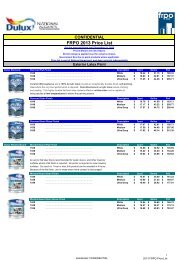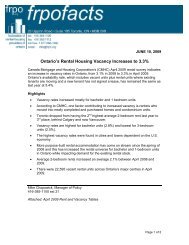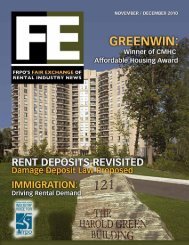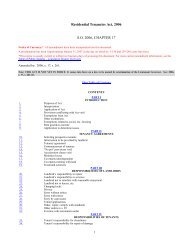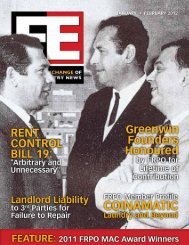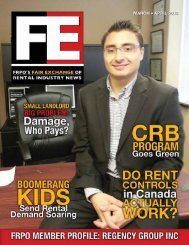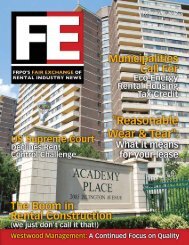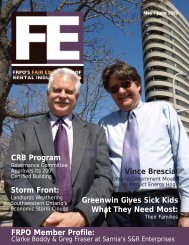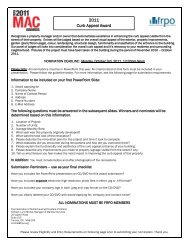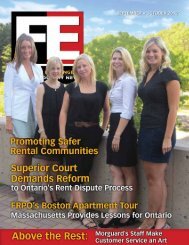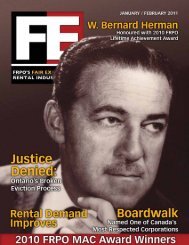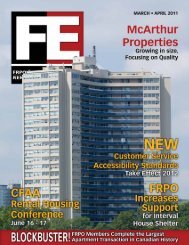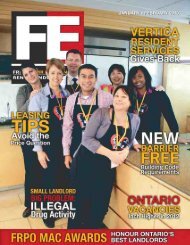Create successful ePaper yourself
Turn your PDF publications into a flip-book with our unique Google optimized e-Paper software.
Fair Exchange • <strong>Sep</strong>tember / <strong>Oct</strong>ober <strong>2009</strong><br />
I’d rather bet on red or black at a casino<br />
than try to guess how any given<br />
Member might decide an issue<br />
described above on any given day.<br />
Resulting from all this confusion and<br />
inconsistency is the mess we find ourselves<br />
in today. Parties shaking their<br />
heads in wonderment as their matters<br />
are dismissed for reasons they can’t<br />
fathom, too many adjournments<br />
causing delay, too many reviews and<br />
appeals, too many highly contested<br />
applications with complex issues<br />
causing delay and depleting Board<br />
resources, and a shocking growth in<br />
tenant claims raised either by filing a<br />
paper application, or simply raised<br />
without notice at a rent hearing thanks<br />
to s.82.<br />
The current government’s addition<br />
of s.82 acts as an invitation to tenants<br />
who fear that they will be homeless<br />
and who can’t pay the rent. It is just<br />
too easy to raise an issue that’s trivial<br />
and blow it out of proportion, or to<br />
manufacture an issue willfully and<br />
compound the problem by refusing<br />
the landlord entry to repair it.<br />
Relying on the honesty and pure<br />
motives of human beings wrapped<br />
up in litigation is just not good<br />
public policy.<br />
But now add in the impending<br />
increase to the monetary jurisdiction<br />
at the Board from $10,000 to $25,000<br />
which will take place on January 1 st ,<br />
2010. Under the Residential Tenancies<br />
Act, the Board’s jurisdiction will<br />
increase by operation of law effective<br />
that same day. Into this brew, we<br />
throw in for good measure:<br />
• A couple of recent decisions at<br />
Divisional Court and the Court of<br />
Appeal regarding entry and rent<br />
increases that are remarkable;<br />
• Another Divisional Court decision<br />
that allows tenants to be<br />
compensated at the Board for<br />
special and general damages in<br />
tort or in contract;<br />
• Another very recent Divisional<br />
Court decision seemingly erasing<br />
limitation periods for tenant<br />
claims and;<br />
• A faltering economy with<br />
employment not recovering<br />
with an ending recession;<br />
And voilà we have the ideal recipe to<br />
create the perfect storm.<br />
There are a number of implications<br />
for the Ministry, and my insiders<br />
suggest that nothing is being done to<br />
prepare. As it stands, the hearing<br />
blocks are too full and the schedule<br />
too crowded to allow adjudicators<br />
time to properly hear complex<br />
matters. When a tenant is making a<br />
claim for $10,000, and soon $25,000,<br />
the landlord or its agent has an obligation<br />
to vigorously defend the<br />
claim and to hold the tenant to strict<br />
proof of same. The current system,<br />
almost unchanged from 1997,<br />
doesn’t permit this. Some Members<br />
baulk when you try to present and<br />
discuss case law or thoroughly<br />
examine a witness. It wouldn’t be<br />
right at the Small Claims Court, and<br />
it’s not right at the Landlord and<br />
Tenant Board. The Board needs to<br />
consider a number of fixes in order<br />
to prevent the system from falling<br />
further into disarray:<br />
1. Revise the disclosure rules to<br />
mirror those in the Small Claims<br />
Courts. Respondents, landlords<br />
or tenants, should have a right to<br />
be aware of the case against them<br />
before they arrive at a hearing.<br />
2. Add adjudicators and hearing<br />
locations if necessary, and only<br />
appoint lawyers as the issues have<br />
become too complex.<br />
3. Consider revising the Rules about<br />
adjournments, costs and payments<br />
into the Board.<br />
4. Consider bringing back default<br />
judgments that were eliminated<br />
under the Residential Tenancies<br />
Act, perhaps extending the<br />
dispute period to 10 days in order<br />
to free up time for the hearing of<br />
other applications.<br />
5. A legislative change to s.82, scrapping<br />
it and requiring tenants to<br />
file applications, serve and disclose<br />
prior to the hearing of the<br />
landlord’s application, or at very<br />
least a requirement for notice and<br />
disclosure prior to the hearing.<br />
6. Put out real stats for the<br />
Minister and the industry,<br />
showing the average time from<br />
the filing of different types of<br />
applications, to the date the<br />
order is finally issued. The<br />
current stat which reveals only<br />
the time from application to the<br />
first appearance, is meaningless,<br />
masks the problem and frankly<br />
is deceptive.<br />
7. We need some common-sense<br />
clarifications and amendments to<br />
the legislation NOW, to fill some<br />
of the gaps and resolve some of<br />
the existing confusion. F<br />
26



